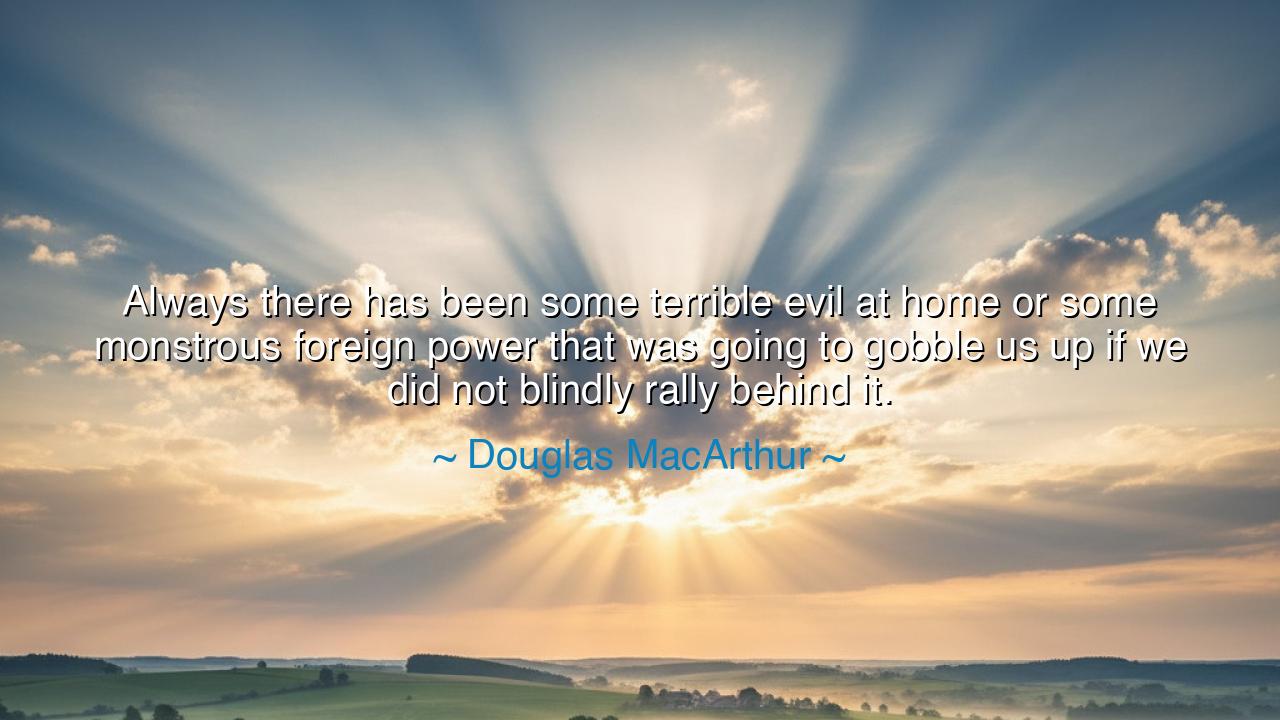
Always there has been some terrible evil at home or some
Always there has been some terrible evil at home or some monstrous foreign power that was going to gobble us up if we did not blindly rally behind it.






In the annals of power and panic, a flint–hard warning is sounded: “Always there has been some terrible evil at home or some monstrous foreign power that was going to gobble us up if we did not blindly rally behind it.” Thus speaks Douglas MacArthur, soldier of triumph and exile, a man who knew both the roar of parades and the chill of recall. Hear the cadence: fear named, enemy magnified, obedience demanded. The sentence is not a counsel of cowardice but a summons to vigilance—the elder’s reminder that the drumbeat of emergency can march a free people past their own thresholds without noticing the hinges break.
MacArthur’s origin for such a thought is written in steel and ash. He saw nations swell with righteous urgency and watched that urgency curdle into overreach. He learned how swiftly public will can be conscripted when the heralds cry terrible evil at home—traitors, subversives, dissidents—or invent a monstrous foreign power so vast that debate itself seems treachery. The general who crossed oceans also crossed the fog of propaganda and returned wary of the alchemy that turns fear into policy and policy into fate.
The ancients knew this spell. In the late Roman Republic, schemers invoked the shadow of invasion and the specter of conspiracy to seize extraordinary powers; “for the safety of the state,” they suspended the very laws that made a state worth saving. In our newer scrolls, one may read of committees and councils that fanned domestic terrors or foreign threats until citizens were bid to blindly rally—to sign blank checks of trust, to muzzle questions, to trade the long patience of liberty for the short heat of certainty. The pattern repeats: an alarm is sounded, the crowd hastens, and oversight sleeps.
Consider a sober historical mirror. In the mid-twentieth century, the Red Scare taught neighbors to fear neighbors, classrooms to fear their own vocabulary, and lawmakers to fear restraint. A terrible evil was announced at home, and careers, reputations, and rights were fed into the furnace to keep the panic bright. In other decades, distant incidents swelled into casus belli through hasty reports and amplified suspicion; the monstrous foreign power was sketched in lines so thick that subtlety could not pass. In each case, those who asked careful questions were told the hour allowed no questions. This is the engine MacArthur warns against: the emergency that justifies everything and explains nothing.
Note that the general does not deny real danger. Armies march; tyrannies advance; saboteurs exist. But he teaches an older arithmetic: prudence must sit beside courage, and evidence beside urgency. A people may fight fiercely and still refuse to blindly rally; they may love their flag without letting fear write their constitution. The wisdom is not pacifism; it is proportion, the steady hand that counts both costs and causes before it signs the ledger of war or repression.
There is also a gentler parable for common days. In any household or workplace, someone will cry crisis to win deference: “If you do not follow me now, ruin waits at the door.” The tactic works because it flatters our bravery and shortcuts our thinking. But communities kept strong do not sprint after every trumpet. They ask: What is the nature of the threat? Who benefits from this alarm? What freedoms must we surrender, and for how long? In such questions, liberty remembers her posture and keeps her balance.
Therefore, let the teaching be carved for our descendants. When you hear of a terrible evil within or a monstrous foreign power without, pause; sharpen your sight; separate courage from credulity. Demand reasons as stout as the remedies proposed. Insist that time-limits, oversight, and clear aims accompany every call to rally. Speak honorably of those who serve—and just as honorably of those who scrutinize—so that valor and accountability never become enemies.
Carry these practices as traveling provisions: (1) Ask for the evidence trail—primary sources, independent confirmations, and defined measures of success. (2) Guard proportionality—let responses fit facts, not fears. (3) Keep sunset clauses on emergency powers and review them in open daylight. (4) Cultivate plural voices—press, courts, scholars, veterans—so that no single drum sets the nation’s stride. (5) In your own circle, refuse to share claims that stoke panic without proof. In these modest, resolute habits, the republic grows less enchantable by alarm—and the people remain ready to fight what is real, without surrendering to what is merely shouted. Keywords: terrible evil, home, monstrous foreign power, gobble us up, blindly rally.






AAdministratorAdministrator
Welcome, honored guests. Please leave a comment, we will respond soon